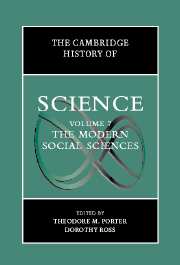Book contents
- Frontmatter
- 1 Introduction: Writing the History of Social Science
- PART I SCIENCES OF THE SOCIAL TO THE LATE NINETEENTH CENTURY
- PART II THE DISCIPLINES IN WESTERN EUROPE AND NORTH AMERICA SINCE ABOUT 1880
- PART III THE INTERNATIONALIZATION OF THE SOCIAL SCIENCES
- PART IV SOCIAL SCIENCE AS DISCOURSE AND PRACTICE IN PUBLIC AND PRIVATE LIFE
- 30 The Uses of the Social Sciences
- 31 Managing the Economy
- 32 Management and Accounting
- 33 Polling in Politics and Industry
- 34 Social Science and Social Planning During the Twentieth Century
- 35 Social Welfare
- 36 Education
- 37 The Culture of Intelligence
- 38 Psychologism and the Child
- 39 Psychiatry
- 40 Gender
- 41 Race and The Social Sciences
- 42 Cultural Relativism
- 43 Modernization
- Index
- References
43 - Modernization
from PART IV - SOCIAL SCIENCE AS DISCOURSE AND PRACTICE IN PUBLIC AND PRIVATE LIFE
Published online by Cambridge University Press: 28 March 2008
- Frontmatter
- 1 Introduction: Writing the History of Social Science
- PART I SCIENCES OF THE SOCIAL TO THE LATE NINETEENTH CENTURY
- PART II THE DISCIPLINES IN WESTERN EUROPE AND NORTH AMERICA SINCE ABOUT 1880
- PART III THE INTERNATIONALIZATION OF THE SOCIAL SCIENCES
- PART IV SOCIAL SCIENCE AS DISCOURSE AND PRACTICE IN PUBLIC AND PRIVATE LIFE
- 30 The Uses of the Social Sciences
- 31 Managing the Economy
- 32 Management and Accounting
- 33 Polling in Politics and Industry
- 34 Social Science and Social Planning During the Twentieth Century
- 35 Social Welfare
- 36 Education
- 37 The Culture of Intelligence
- 38 Psychologism and the Child
- 39 Psychiatry
- 40 Gender
- 41 Race and The Social Sciences
- 42 Cultural Relativism
- 43 Modernization
- Index
- References
Summary
In 1979, Immanuel Wallerstein proclaimed the death of modernization theory. The concept of modernization, he argued, had finally been recognized as a “cul-de-sac,” an intellectual obstruction that had confined decades of social scientific inquiry. Drawing scholars away from questions about the essential nature, historical construction, and lasting power of a capitalist world system, it had only encouraged “comparative measurements of non-comparable and non-autonomous entities.” As social scientists invoked objectivity, employed structural-functional indices, and ordered nation-states in terms of relative “progress,” they ignored the power that structured global flows of resources. The concept had been, perhaps, a “worthy parable” for its time. By inventing “development” and the “Third World,” well-intentioned liberal social scientists had offered “new hope” that destitute peoples might emerge into twentieth-century light. If the “underdeveloped were clever enough to invent an indigenous version of Calvinism … or if transistors were placed in remote villages, or if farsighted elites mobilized benighted masses with the aid of altruistic outsiders,” then the “underdeveloped too would cross the river Jordan and come into a land flowing with milk and honey.” The time had come, however, to reject modernization, “to put away childish things, and look reality in its face.”
While perhaps the most striking, Wallerstein’s was not the only unflattering epitaph for modernization theory. Starting in the mid-1960s and continuing on through the 1970s, a broad range of scholars generated a massive literature criticizing the idea that all of the world’s nations followed the same essential trajectory of growth, a pattern most clearly identified in the history of Western accomplishment.
- Type
- Chapter
- Information
- The Cambridge History of Science , pp. 721 - 734Publisher: Cambridge University PressPrint publication year: 2003
References
- 2
- Cited by

